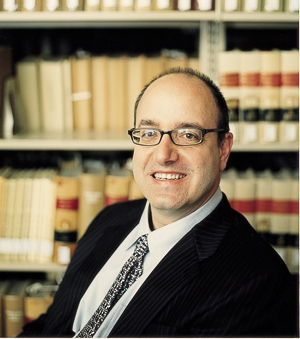From the Dean

Can you imagine completing medical school without having ever been asked seriously to consider what kind of doctor you want to become? And not just medical school. You could not do this at a school of psychology or education or engineering. You could not do it at any professional school. Except for law. Robust career advising has never been part of the law school culture. Why? Because historically we have not needed to help our students choose. Law students could begin that process after graduating, by going to private firms that let them wander among practice areas for three or four years before finally settling down. • This system was collapsing even before the current financial crisis, which can probably be counted on to lay it permanently to rest. Clients are increasingly unwilling to pay for recent graduates to spend time just trying things out. Graduates arriving at their first job today find themselves assigned to whatever area in the firm needs their help most—and clients and firms want them prepared to hit the ground running. All of which means law schools can no longer ignore their responsibility to help students make intelligent choices about the kind of lawyer they want to be, and to prepare for it, while they are still in school. • One way in which Stanford is addressing this problem is with SLSConnect, an innovative, interactive social and professional networking site built exclusively for Stanford Law alumni and students. I initiated the project because, during my five years here, I have been so impressed by how close our graduates stay to one another (something easily seen by leafing through the magazine’s rich “Classmates” section). This is not the case at every law school. Our alumni care deeply about the school, about its fortunes, and about its students’ prospects. There is, we realized, enormous untapped potential in this tight-knit community: potential not only to strengthen ties among alumni but also to innovate in delivering the best possible advice to students. SLSConnect can help in this effort. SLSConnect contains three interrelated components that benefit from your participation. First is a sort of “Wikipedia” for law students about different practice areas. The Career Wikis section describes what lawyers in different practice areas do day to day: what the work is like, what skills lawyers need, what they wish they had studied in law school, and so on. These are available for law students to browse, so they can begin the process of discovering what career paths might interest them. Each wiki was started from a description prepared by alumni who work in the practice area. Like all wikis, however, to succeed we need others who practice to revise and update.
The Career Wikis section works with SLSConnect’s second component, the social networking feature, that serves as a kind of “Facebook” for students and alumni. Students intrigued by a particular practice can reach out directly to alumni who work in the area—ask questions, make contacts, and learn more of what they need to do in school and after.
Social networking through SLSConnect benefits alumni as well, making it easier to keep in touch with friends. SLSConnect also functions as a private portal for the law school: the place to go to learn about reunions, updates on classmates, and other exclusive content—lectures, online conversations, and more.
We don’t expect SLSConnect to substitute for Facebook or LinkedIn. The social media landscape is a busy place. But with this in mind, we’ve kept offerings inside SLSConnect unique and exclusive to the SLS community. We ask only that you register, use the network as you see fit, and make yourselves available to students who seek the benefit of your wisdom and experience.
The third component of SLSConnect rolling out next year consists of an interactive course guide. Based on extensive interviews with faculty and alumni, the guide will be a connected tool offering guidance about where to go in the law school and university to find the skills students need. The guide will link directly to the Career Wikis within SLSConnect. The addition of the course guide will help students make use of what they learned from these wikis and their networks within SLSConnect.
With your help, SLSConnect could revolutionize the process of law school career advising. Everything we’ve done in the past few years to enhance our curriculum—offering students more and better course opportunities, making greater use of the whole university—will matter only if students can use the new curriculum intelligently. SLSConnect is thus an easy but important way for everyone who went to Stanford Law School to help students get the best possible education and, hopefully, make our connections to one another even stronger.
